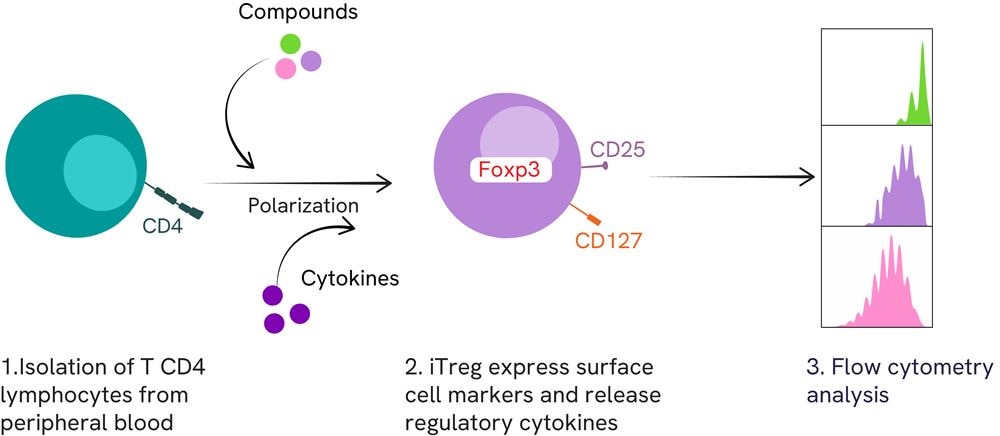Understand the effect of your therapeutic candidate with an iTreg polarization assay that assesses the impairment of T lymphocyte regulatory cells in-vitro. As working with regulatory T cells is challenging, leverage our scientific expertise in compound screening with immune cells and get data quickly to advance your drug discovery with certainty.
Receive reliable quantitative data from inducible T regulatory lymphocytes screening with the iTreg polarization assay and assess the effectiveness of your therapeutic candidate in modulating a T cell regulatory phenotype. Benefit from working with our skilled scientists, high throughput validated pipelines and robust statistical analytics to save yourself valuable time and resources.
iTreg polarization assay service
Our iTreg polarization assay enables rapid identification of therapeutic candidates that can control the polarization of naive T cells into a regulatory phenotype. Candidates are run in a validated and optimized miniaturized screening setup that provides consistent and reliable data. Small molecules or biologics are assessed in a semi-automated high throughput configuration, supporting your project with data to move closer to the clinic.
Key advantages:
- Quick project completion in 4 weeks
- Fast, semi-automated and reproducible 384-well high throughput assay format.
- Designed for immuno-oncology and autoimmunity applications.
- Highly enriched human primary T cells from multiple donors to address donor-to-donor variability.
- Robust quantitative data.
What is an iTreg polarization assay?
The iTreg polarization assay helps to determine the effect of therapeutic candidates on the phenotype or functional state of the inducible T lymphocyte regulatory cells. These cells are essential in controlling the immune response and maintaining self-tolerance.
Why use an iTreg polarization assay for drug discovery?
The iTreg polarization assay is a rapid in-vitro monoculture system to assess the desired impact of therapeutic candidates to modulate the iTreg polarization phenotype. For immuno-oncology applications, compounds tested in these assays can demonstrate control of the polarization of a regulatory phenotype. Therapeutics that promote Treg polarization towards an anti-inflammatory phenotype can be tested for their ability to suppress inflammation and prevent disease.
Main Applications of iTreg polarization assay
In drug screening, the iTreg polarization assay can evaluate the potential of a drug to impair iTreg function. This could help treat cancer where inhibiting Treg activity can help boost antitumor immune responses. Also, the assay can test the effectiveness of a drug in enhancing the regulatory phenotype of iTregs, which could be beneficial for treating autoimmune diseases or transplant rejection.
Request a quote
Discuss your project with our expert team
Check our standard deliverables and sample data. Discuss your project with our team today.
Supporting data
Download App Note
Understand the scientific data you can obtain with our services.
Immunology services
Browse immunology assays
Get reliable data from primary immune cells
How the iTreg polarization assay works

Standard iTreg polarization assay. Naïve CD4+ T cells isolated from peripheral blood mononuclear cells (PBMC) are stimulated with a polarization cocktail towards iTreg cells. Therapeutic candidates can be screened for their capability to influence the expression of the surface markers CD127 and CD25 and the transcription factor Foxp3.

